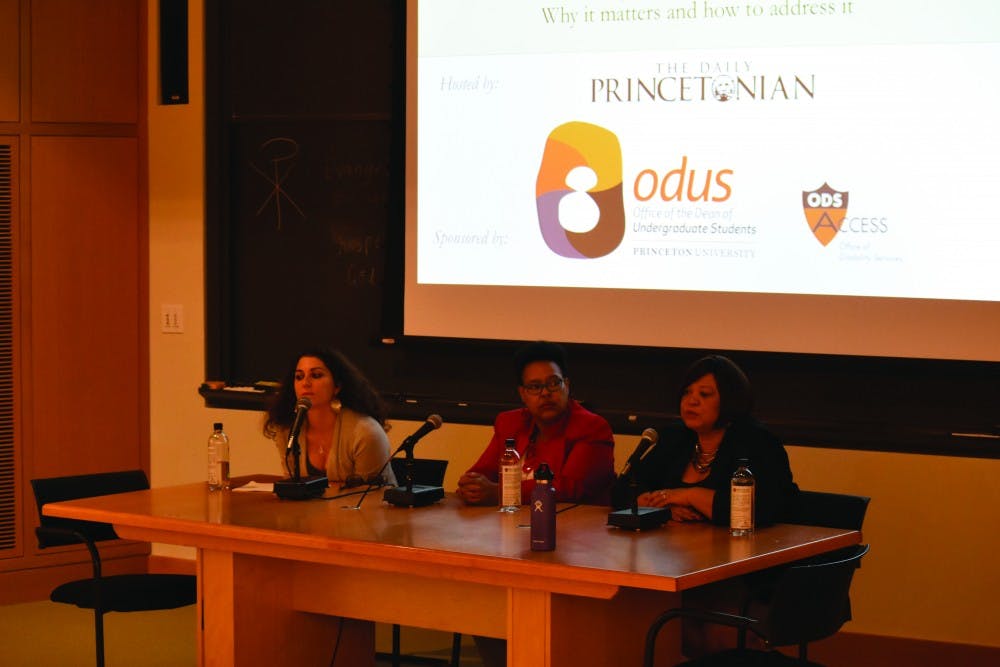In a panel hosted by the Daily Princetonian, three journalists discussed the aspect of diversity, or lack thereof, in newsrooms and the media industry.
Benét Wilson, who has hosted workshops and discussions on diversity, said that she is inspired to continue participating in events because of the students she meets and learning about their successes later on.
“What keeps me going is seeing students and young people doing well in their careers. It can get really tiring sometimes… having to explain why [diversity] is important, and whenever I get tired I get a call from a student or I get a call from a young person who has just gotten a job. And that reminds me why I do what I do,” Wilson said, adding that she enjoys serving as both a cheerleader for young people but also giving them tough love.
Wilson is a freelance journalist specializing in the aviation industry, and is the founder and editor-in-chief of Aviation Queen LLC. She also serves as an air travel expert for About.com and as a senior business editor for “Airport Business” magazine.
Alia Malek, a former reporter for Al Jazeera and a civil rights lawyer specializing in the Middle East, said that practicing law for six years gave her insight into how Arab-Americans are portrayed negatively in the media and are often excluded from American narratives.
“[Arab-Americans] are often the subject of very bad journalism, and the effects of very bad journalism, I think, in the Middle East has meant really bad foreign policy on the United States’ behalf because journalism lays the ground to dehumanize people, to make conflicts look really simplistic,” she said. “As an Arab-American, the fact that we were completely left out of the narratives of contemporary America or historical America… has been really damaging to Arabs in the United States, and their diaspora is really invisible here.”
Malek said that she started working as a journalist to fix this problem at its root, to “become a part of the profession that shapes the knowledge people have about these communities.”
Sandra Clark said that a crucial point to her being in a management role is to champion for diversity.
Clark is the Vice President for News and Civic Dialogueof the news team at WHYY, and is a former managing editor of "The Philadelphia Inquirer”
“If anything, this election has shown us the need for diversity in journalism because, my gosh, you watch TV every day and everyone sort of flogs themselves with ‘What did we miss?’ Well what you missed is knowing anything about these communities at all,” she said, noting that part of the success of President-elect Donald Trump was his campaign’s awareness that the United States has a largely uninformed populace.
“Diversity in of itself is a very complex issue, and we all have our own histories. So for me it’s not so much about diversifying newsrooms – I mean that is extremely important, a number of our newsrooms aren’t diverse enough – but it’s about truth," she explained. "And how can you tell truth if you don’t have different perspectives within your newsroom that challenge us to think differently and to go to different corners of our communities?”
Wilson described how people are uncomfortable with leaving their own groups to seek those who are diverse and can work in the media industry. “I think people get so in their little niches and groups, that they don’t want to look beyond their circles, and they don’t want to look beyond their little islands and communities. And, if they did that, it would actually benefit them to see that there are talented people of color, who are diverse in the largest, broadest sense of the word.”

She added that having a diverse newsroom has financial benefits, explaining, “It’s going to bring you money to have a more diverse newsroom, because the news is becoming more diverse. If you don’t have that reflected in your newsroom, it’s going to hurt you financially.”
Clark agreed, saying, “We’re really good about writing about diversity for every other company but our own.” She added that while media outlets may currently criticize the lack of diversity in Trump’s prospective presidential cabinet, this type of diversity does not reflect in those same newsrooms.
Malek noted that the media industry tends to be incestuous, and that this lowers the level of accountability outlets have to diversify their staff.
“If they were to change, it is to admit that they are part of the problem and that they have been doing something wrong,” she said, adding that it is crucial to have staff with different backgrounds to accurately cover different types of communities.
A discussion-styled Q&A session followed the panel, with topics ranging from the media’s role in covering the 2016 presidential campaign to how individuals can create spaces of inclusion for minority peers.
The panel, titled, “Diversity in the Newsroom: Why it matters and how to address it,” took place in East Pyne 010 at 4:30 p.m. and was co-sponsored by the Office of the Dean of the Undergraduate Students and the Office of the Disability Services.








